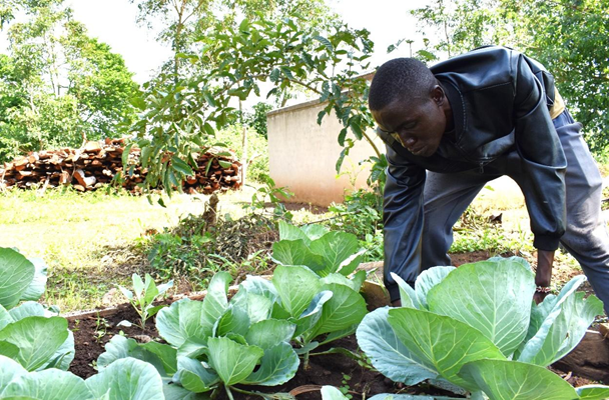
Sustainable Agriculture: Joshua Mudope’s Farming Success Story
Meet a young Ugandan farmer who received sustainable agriculture training that not only increased his yields but also inspired his community.
Joshua Mudope’s Move from Urban Commerce to Rural Horticulture
In the bustling heart of Kampala, Uganda, Joshua Mudope once thrived in the business of buying and selling produce. Yet, deep down, he felt a pull toward something more meaningful that could sustain him and inspire others.
That pull led him away from Uganda’s capital city back to his roots in Lira East, Te-obwolo cell, where he embarked on a journey that would redefine his life.
Uganda’s northern region is promising for horticulture production. With a tropical climate and distinct wet and dry seasons, the area provides excellent conditions for cultivating a wide range of crops with ample land for agricultural expansion and experimentation.
Sustainable Agriculture Techniques Adopted by Joshua
At 32, married, and with one child, Joshua switched from urban commerce to rural agriculture. He began managing his farm before arriving in person by using his phone to communicate with his farm employees. But that was a challenge because he couldn’t tell if his crops were taken care of and how his employees were managing the farm. It was also difficult to verify the reports he was receiving over the phone.
Joshua found himself with a farm that wasn’t working well. He needed new skills. When he learned about TechnoServe’s Northern Uganda Horticulture Market Acceleration Program (NU-HortiMAP), he recognized an opportunity to build something more meaningful that could sustain him and inspire others. In October 2023, Joshua attended our training, which was facilitated by implementing partner Oasis Agribusiness (U) Limited. It unlocked a wealth of knowledge for Joshua, including site selection, nursery bed preparation, seedling management, and more.
The program, which ran from 2022 to 2024, was implemented with funding from the Agricultural Business Initiative (aBi) across eight districts in Uganda (Amuru, Gulu, Kitgum, Kole, Lira, Nwoya, Oyam, and Pader). It promoted holistic and inclusive approaches to sustainable horticulture development for smallholder farmers.
“The program enabled the smallholder farmers to adopt climate-smart and regenerative adaptation practices,” said NU-HortiMAP Program Manager Tobby Ojok. “It promoted the competitiveness of micro-business, providing inputs, financial literacy, and access to financial products and services, including access to credit.”
Joshua was one of the 7,642 smallholder farmers—3,064 women—selected and trained in good agronomic and regenerative agricultural practices. Through this training, he mastered nursery bed development and pest and disease identification. He also learned farm safety measures to ensure his crops would not be damaged, destroyed, or infected unintentionally.
“I am now able to cultivate my vegetables in a controlled environment, with few disease attacks,” Joshua said. “From the training, I also learned to make my organic fertilizer. It is possible to create what you once bought.”
TechnoServe also offered a greenhouse equipped with drip lines. Through a cost-sharing arrangement with TechnoServe, Joshua bought an irrigation system to help him water his field crops during the dry seasons.
The Impact of Sustainable Agriculture on Joshua and His Community
Armed with newfound expertise, Joshua embraced modern techniques and employed part-time student workers to assist with tasks like transplanting and crop maintenance, providing them with valuable pocket money.
As his farm flourished, so did Joshua’s confidence.
“What I have learned is that one does not need lots of money to start on horticulture,” Joshua explained. “When I started seeing the results of applying what I’ve learned, I wondered why I hadn’t done this sooner! I have more time with my family and can provide for their needs better. I have also started relieving my mother of some financial responsibilities so she can enjoy her retirement.” He was all smiles.
Joshua’s achievements are a beacon of hope to his community. His dream is to inspire others just like him.
“I want people to see that it is possible to adapt to a new life and achieve what they once thought impossible,” Joshua reflected.
Joshua Mudope’s story is a testament to horticulture’s potential to transform lives and communities. It presents a good example of the spirit of resilience and innovation that defines the journey from dreams to reality.
Frequently Asked Questions (FAQs)
- What is sustainable agriculture?
The United Nations Environment Program defines sustainable agriculture as “farming that meets the needs of existing and future generations, while also ensuring profitability, environmental health, and social and economic equity. It favors techniques that emulate nature–to preserve soil fertility, prevent water pollution, and protect biodiversity. It is also a way to support the achievement of global objectives, like the Sustainable Development Goals and Zero Hunger.”
- How can smallholder farmers adopt sustainable farming?
Smallholder farmers can adopt sustainable farming practices like improving crop quality and quantity through practices like drip irrigation and organic inputs.
- What are the key benefits of using organic fertilizers?
Most crops benefit from some sort of fertilizer use, whether organic or inorganic. Fertilizers can greatly improve soil structure, quality, and nutrient content, helping plants thrive. However, not all fertilizers are created equal. Synthetic fertilizers, while fast-acting, can also be detrimental to the environment if not applied with precision. Organic fertilizers like vermicompost can present a viable alternative.
When vermicompost is used instead of synthetic fertilizer, seed germination is accelerated, raising crop yields and quality and improving insect control. Vermicompost is a low-input production system that can help small and medium-sized producers compensate for the initial product decline in the transition from conventional to organic agriculture.

